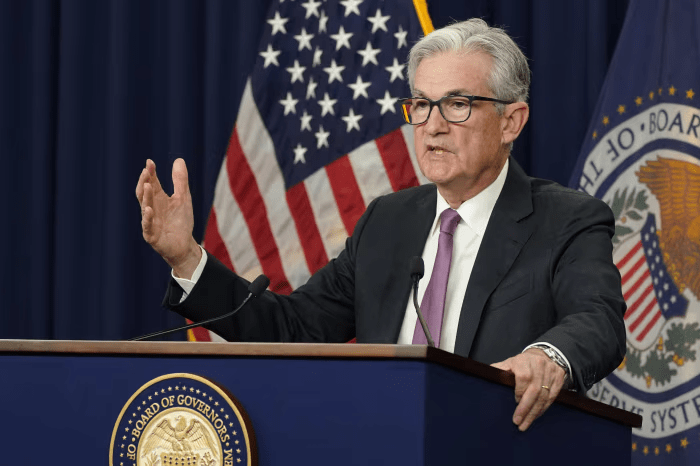
It was learned that Federal Reserve Chairman Jerome Powell's speech at Jackson Hole triggered a rise in risk assets. However, some investors are cautious about Powell's dovish remarks, fearing a future stagflation scenario and worrying that the market is overly optimistic.
Powell delivered his final remarks as Federal Reserve Chair at the Jackson Hole Economic Symposium on Friday. He hinted at a possible rate cut in September but did not make a definitive statement, seeking an appropriate balance between the increasing risks in the labor market and persistent inflation concerns.
Powell's remarks came against the backdrop of increasing pressure from the White House to ease monetary policy. The White House's actions have raised market concerns that political factors may lead the Federal Reserve to be overly aggressive in cutting interest rates in the future.
Matthew Miskin, Co-Head of Investment Strategy at Manulife Investments, stated: "Powell has indeed locked in a rate cut in September, and this certainty is having a positive impact on global markets. However, this leaves an important question: what will happen after September? I think this is where the market is overly optimistic."
Before the Jackson Hole meeting, the U.S. employment report for July performed poorly, and previously released employment data was also significantly revised downward, sparking market expectations that the Federal Reserve would lower interest rates from the current 4.25%-4.5% range later this year.
However, in recent weeks, these expectations have gradually weakened, as the spike in wholesale prices in July raised concerns that high inflation would limit the Federal Reserve's ability to save the economy through aggressive rate cuts.
Drew Matus, Chief Market Strategist at Metlife Investment Management, stated: "People are increasingly worried that the U.S. is heading toward a stagflation scenario." Stagflation refers to the situation where slow economic growth and high inflation coexist.
Matus added that investors had originally expected inflation to "last for a while," but the real question remains how much the economy can grow.
Matus stated: "I believe we will achieve some growth, but it won't feel great."
Investors also noted that more inflation and labor market data would be released before the Federal Reserve's next meeting, which could influence interest rate decisions and potentially hinder market gains.
Tom Graff, Chief Investment Officer at Facet, stated: "Looking ahead to the next few months, merely cutting rates will not be enough to sustain a rally in the stock market. If the economy truly stagnates and the labor market continues to deteriorate, then this round of stock market gains will face risks."
The market increased bets on a rate cut in September.
Others in the market believe that optimism is warranted.
Paul Eitelman, Global Chief Investment Strategist at Russell Investments, stated: "If the Federal Reserve decides to take action to gradually lower interest rates and slightly ease control over the economy, I think it would be entirely reasonable to see a market rebound."
Before Powell's speech, interest rate futures traders had estimated a 70% chance of a 25 basis point rate cut in September. Data from LSEG showed that this possibility rose to 80% later on Friday.
The yield on the 2-year U.S. Treasury bond, which is sensitive to interest rates, fell about 10 basis points to 3.69%. The yield on the benchmark 10-year U.S. Treasury bond dropped nearly 8 basis points to 4.26%. Bond yields move inversely to prices.
On Friday, major U.S. stock indices surged. The Dow rose 1.89%, hitting a record high, the S&P 500 rose 1.52%, approaching historical highs, and the Nasdaq rose 1.88%. The small-cap Russell 2000 index climbed 3.8%.
Angelo Kourkafas, Senior Investment Strategist at Edward Jones, stated that Powell's remarks were "good news for the market." He said: "We still expect further policy easing, and this fact at least provides some reassurance that the (stock) valuations and market expectations have some basis."
Concerns about the Federal Reserve's independence
However, Powell's speech raised market concerns about an economic slowdown, leading to a sharp decline in the dollar. Concerns about the Federal Reserve's independence exacerbated the selling of the dollar.
Lower interest rates may reduce the dollar's appeal to investors seeking high yields, thus decreasing demand for the dollar. It fell by 1%.
Chief Market Strategist Karl Schamotta stated: "The interest rate spread is having a negative impact on the dollar." He also added that traders are preparing for a "significant rally outside of the U.S."
Powell's term as Federal Reserve Chair will end in May next year. President Donald Trump had previously pressured Powell to cut interest rates. Powell reiterated on Friday that the Federal Reserve's policy would be strictly data-driven and would not deviate from this principle.
However, earlier this week, Trump urged Federal Reserve Governor Lisa to resign, a move that could allow him to appoint more dovish members to the Federal Open Market Committee responsible for setting interest rates. Trump stated on Friday that he would fire her if she did not resign due to the mortgage scandal.
Helen Given, Head of Trading at Monex USA, stated: "Trump's comments... have once again raised concerns about the independence of the Federal Reserve."
Zhitong Finance $ETH

